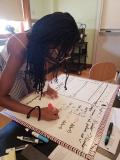Saturday, July 21, 2018
By:
“We are scientists, and often times, scientists don’t know where they’re going sometimes. It’s important to set that tone in a physics classroom.”
Dear Internet,
After being in Chicago and Miami, I came back to D.C. to briefly spend my weekend with the other interns. I spent a majority of those two days getting some much needed rest--I won’t be getting a weekend to myself until August.
Most memorable is the getting Ethiopian food with some of the other interns. For about half of the interns who went, it was their first time eating ethiopian food. I can't describe the glee and shock on their faces when the piles of food arrived at our table, but I will provide a picture of us all below. That sunday night, after a couple of delays and cancellations of my initial flight, I found myself on a plane ride going back to Chicago to continue the Computational Modeling Workshop.
This time around I had a full week to explore Chicago, delve into modeling and pyret, and connect with the other participants. I listened to healthy debates and theories about the best order to teach physics in (the traditional way of teaching forces first isn’t always the most effective!), and learned different models to represent, say, acceleration.
What surprised me most was how engaging each day was. You would think that I, a physics major halfway done with her program, as well as someone who took a total of four physics courses in high school, would be bored with the physics geared towards ninth grade students. It happened to be the exact opposite--the modeling methods re-invigorated my love for physics, and deepened my current understanding of elementary topics like acceleration, or gravity.
Learning Pyret also pushed me to be comfortable with getting things wrong, and with failing, and with the general unknown. We used Pyret to test out phenomena--and as we were learning Pyret for the first time, the teachers and I struggled a lot with it. But as one teacher noted, and as I quoted above, "scientists don't know where they're going sometimes". This is something I hope to establish in my classroom and in other physics education spaces--failure and frustration is often part of the learning process, and it's important to be comfortable with that, and use it to propel you forward instead of dissuade you.
I’m excited to bring what I learned in that workshop to my student teaching next fall. But until then, I’m considering test-running some of the language and activities used in this workshop to support the physics workshop/recitation that I run at my college. A lot of the freshman taking first year courses come in with many physics misconceptions (like the direction of velocity vs the direction of acceleration in circular motion, or the idea of equal and opposite forces), so I hope that the modeling ideas can help them better understand physics phenomena.
Two workshops/fellowships/conferences down...and two more to go.
See you later, post the AAPT/AIP Policy Fellowship,
Krystina
Krystina Williamson



